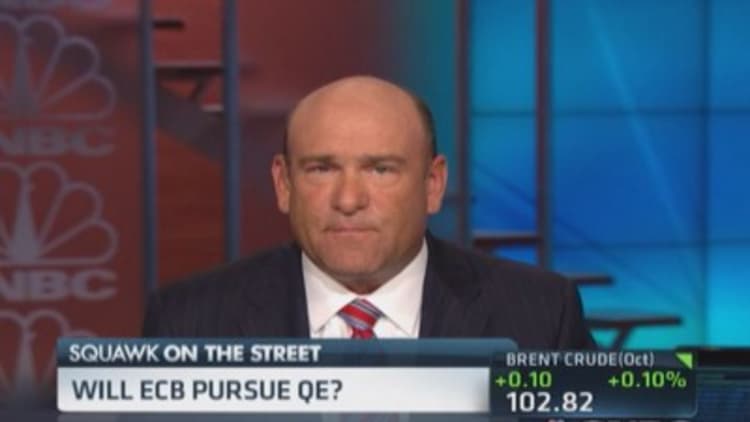
Europe is in the throes of a critical debate about whether it should embark on an American-style quantitative easing program and is looking to the U.S. for answers about how and if the measure would work on the Continent.
The debate heated up after European Central Bank President Mario Draghi in Jackson Hole, Wyoming, last week noted that inflation expectations have been falling, and said the ECB's Governing Council "will acknowledge these developments" at its meeting this week and "within its mandate will use all of the available instruments needed to ensure price stability over the medium term."
That, in turn, raised expectations for further action, if not this week, then in the months ahead.
"They need to do shock and awe,'' said former Fed Governor Rick Mishkin, instrumental in helping form the U.S. QE policy. "They are so far behind the curve." Mishkin said a QE program would be seen by markets as a commitment by the central bank to reflate the economy and would have positive effects on growth and employment.
But a former European central banker, who asked not to be named, disagreed, saying the politics are difficult and the economic benefits uncertain compared to the potential costs. "Aggressive QE in terms of government bond purchases will be difficult to execute and creates big political problems."
Read MoreHow to play ECB QE
Germany and other nations have indicated concern with the European Central Bank expanding its balance sheet and buying bonds of countries with lax financial discipline, essentially forcing Germans to be a part buyer of those bonds thru the ECB.
From the other side, some nations could find it unfair since ECB purchases of government bonds that are proportional to the size of each economy could mean up to 30 percent of its QE would be German.
Inside the ECB, economists are mulling the economic question of what good QE might do. Here are three ways that economists believe QE works and whether it would have any benefit for Europe.
Credit easing effect
This is the most obvious. By buying a fixed income security, the central bank drives the price up and the yield down. This is thought to have an effect on a broad spectrum of debt, since lowering the yield on the risk-free or sovereign bond rate brings down other rates as well.
The U.S. Federal Reserve went further than just buying Treasurys, adding mortgage-backed securities into the mix. The ECB's plans to purchase asset-backed securities could end up mirroring this: Targeting a specific credit sector for lower rates.
Read MoreECB vs BOJ: Which central bank will ease first?
This is a potentially tough argument in Europe right now. Bond yields have already fallen sharply, bringing corporate rates down with them. Some argue this decline has occurred in anticipation of European QE, and warned they could rise back up if Draghi doesn't follow through with outright QE. But it could just as well be that European rates have fallen along with a reduced outlook for inflation.
Portfolio effect
By driving down yields, it's believed that QE forces investors to take on greater risk. With yields so low in government bonds, investors instead seek higher returns in stocks and other riskier credits that help growth in the real economy. Higher stock prices, for example, are often associated with greater capital spending. Initially, capex lagged in the U.S. during the Fed's QE purchases, but it now seems to be picking up.
Read MoreECB can afford to be patient on easing: Barclays
The knock on the portfolio effect is that it creates capital misallocation, forcing investors to put money in places where they are not comfortable. When rates rise back up, that money could move back to bonds, creating a destabilizing decline in stocks. Weighing against this is the idea that capital is already misallocated: really low yields show lots of investors have piled into risk-free bonds who would be taking more risk in a more normal economy.
Expectations effect
There is a mystique in the way that central banks work. In fact, most investors (and even monetary policy experts) don't fully understand the way that central bank policy affects interest rates and the economy. Hence, phrases like "Don't fight the Fed." But what investors do understand well are signals and intentions of a central bank. A QE policy, experts say, would be a signal that Draghi and the ECB are fully committed to their 2 percent inflation target and will do "whatever it takes" to hit their goals. A similar comment from Draghi helped the bonds of troubled European countries recover.
—By CNBC's Steve Liesman


